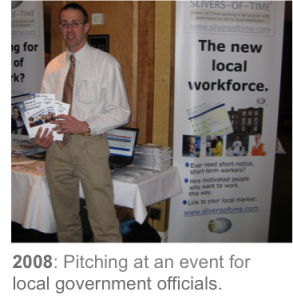[ezcol_2third] I became absorbed in irregular work when it was a minor issue. Now it’s huge.
I became absorbed in irregular work when it was a minor issue. Now it’s huge.
Early into the Net
In 1995 I was a television journalist, fronting a series about how Brits were embracing a wierd new phenomenon: the Internet. Interviewing criminals, love-seekers, adult babies, UFO abductees, and others thriving online paid my rent. But I become personally intrigued about how web platforms might eventually widen economic activity.
 I worked with a think-tank and had a book published internationally. I anticipated the “sharing economy”. Then Britain’s Office of the Deputy Prime Minister decided to launch new markets for citizens who wanted to work but couldn’t commit to regular hours. I ran the programs.
I worked with a think-tank and had a book published internationally. I anticipated the “sharing economy”. Then Britain’s Office of the Deputy Prime Minister decided to launch new markets for citizens who wanted to work but couldn’t commit to regular hours. I ran the programs.
Now I was immersed with people whose lives were shaped by fluctuating disability, care-giving, or complex parenting arrangements. My new interviewees couldn’t hold a job and fell through gaps in employment support. Many of them worked illicitly for cash-in-hand. Most were desperate for meaningful work.
Memories
Irregulars I particularly remember:
- A Single Mom whose 10-year-old had unpredictable seizures and panic attacks. Her contact center job ended after too many sudden summons from school.
- A couple in their 50’s injured together in a motorbike accident. Varying neck pain ended his warehouse job. Her leg injuries required months of treatment.
- A former teacher, 60-ish, caring for two parents with Alzheimer’s. Some times they had day care or family support, other times he had to be at home for them.
 We also discovered people who saw working irregularly as the way to progress:
We also discovered people who saw working irregularly as the way to progress:
- Many low-income students have non-regular classes, workshop times or assignments. They have to fit hours of work in the gaps to support themselves.
- Micro-entrepreneurs want to prioritize their fledgling business. I recall a gutsy Welsh lady, after failing to get so many jobs, determined to start an at-home hairdressing business. She then needed other work to fit around a few appointments each week.
- Some wanted to fit work around their calling. One lad, determined to make the Olympic canoe team, dropped everything and grabbed his paddle as soon as a river was in spate. He needed to earn when flow was less dramatic.
It wasn’t just that these research subjects needed income. They saw meaningful employment as a way to contribute; a source of purpose, human contact, and dignity.
I became convinced it was not just a human tragedy if they were marginalized into meaningless work, but an economic loss. Anyone surviving tough life circumstances, or driven by unstoppable ambition, is resourceful and adaptable. It’s in everyone’s interest to have them giving their all in the local economy.
Job paradox
The explosion of irregular work since 2008’s financial crisis is unarguable. But government employment initiatives continue to focus almost exclusively on traditional job creation and measurement. And there’s often an experience bias. Most decision-makers controlling funding and priorities for employment support have risen through a lifetime of jobs. They can understandably see any form of employment other than a 9-to-5 as peripheral or to be resisted.
 But the irregularity crisis hits so many people. It needs a range of responses. Some are variants of the training/support/benefits models established for traditional employment development. They’re typically within the comfort zone for philanthropies and public agencies.
But the irregularity crisis hits so many people. It needs a range of responses. Some are variants of the training/support/benefits models established for traditional employment development. They’re typically within the comfort zone for philanthropies and public agencies.
My colleagues and I have arrived in a different category: comprehensive neutral infrastructure for this new world of work. We operate at the intersection of public employment services, new marketplace technologies, and social action. Our focus is giving away all the tech. and learning.
It’s an exhilarating journey with enormous social impact for those who get it right. Get in touch if you want to come onboard!
Wingham Rowan
→ Contact
[/ezcol_2third] [ezcol_1third_end][/ezcol_1third_end]
